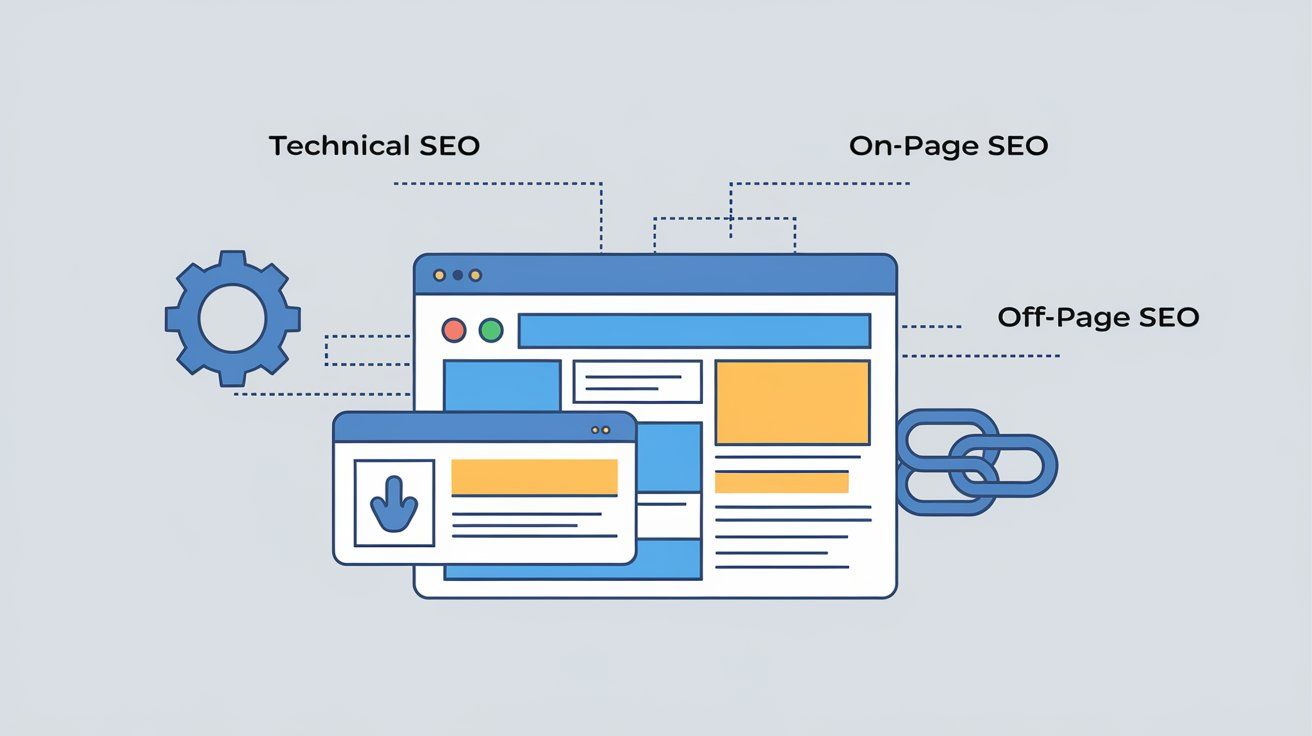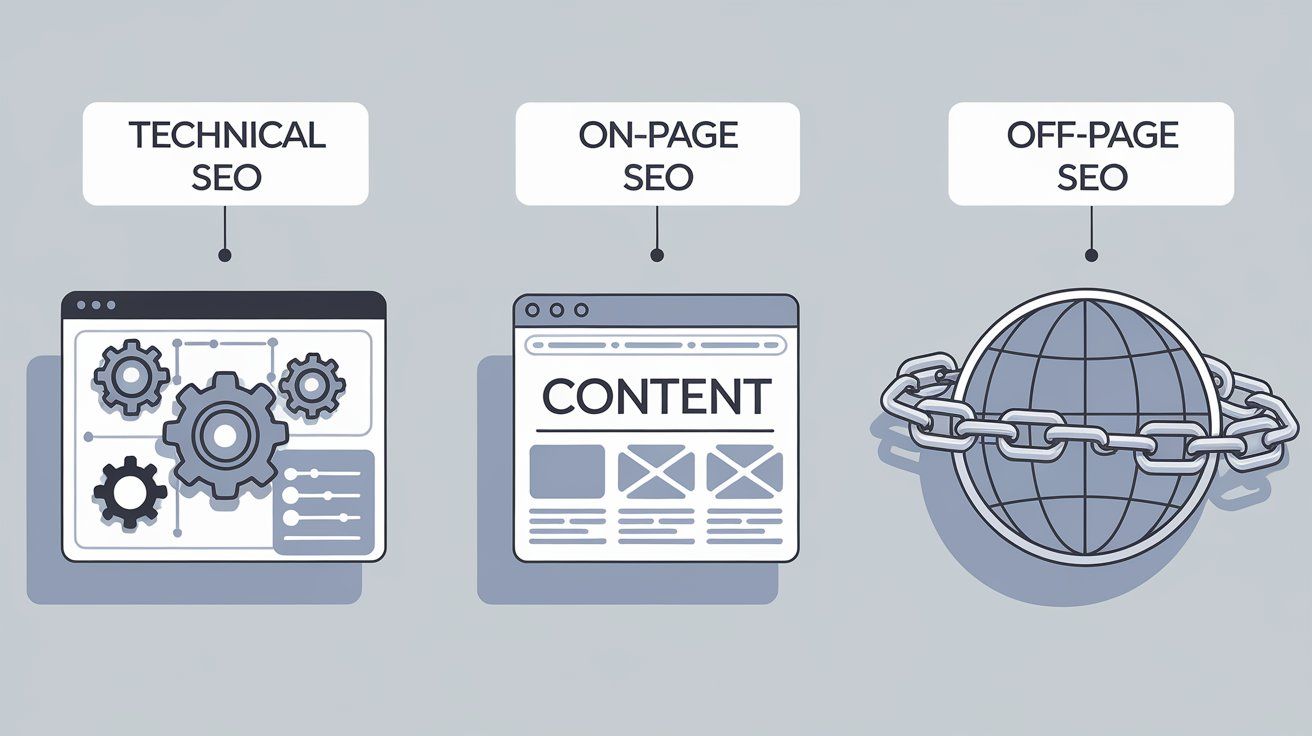727.222.6984
5006 Trouble Creek Rd, New Port Richey, FL, 34652, United States
SEO Task List by Service Type: Know What You're Buying

Technical SEO: What It Is and Why It Matters
What is Technical SEO?
Technical SEO refers to the optimization of your website’s backend structure to make it easier for search engines to crawl, index, and rank your content. Think of it as the foundation of your website; without a solid technical base, even the best content and marketing efforts can struggle to perform.
Tasks Included in Technical SEO:
- Improving Site Speed: Optimizing images, compressing files, and utilizing browser caching to ensure faster page loading.
- Fixing Crawl Errors: Ensuring search engines can properly crawl your website without encountering broken links or other issues.
- Implementing SSL Certificates: Securing your website with HTTPS to build trust and improve rankings.
- Mobile Optimization: Making your website responsive and functional on all devices, especially mobile.
What to Expect When You Improve Technical SEO:
After addressing technical SEO, you can expect smoother website performance, faster load times, and improved visibility in search engine results. These changes can result in a more user-friendly experience, which in turn reduces bounce rates and boosts engagement.

On-Page SEO: Optimizing Content for Success
What is On-Page SEO?
On-page SEO focuses on optimizing individual pages of your website, ensuring the content is relevant, high-quality, and well-structured for both users and search engines. This includes everything from keyword usage to meta tags and content hierarchy.
Tasks Included in On-Page SEO:
- Keyword Optimization: Placing relevant keywords in strategic locations like headers, meta descriptions, and image alt tags.
- Content Updates: Ensuring your content is fresh, valuable, and optimized for user intent.
- Internal Linking: Creating a strong internal link structure to help search engines understand your content hierarchy.
- Meta Tags & Descriptions: Crafting concise, keyword-rich meta titles and descriptions to improve click-through rates.
What to Expect When You Improve On-Page SEO:
Optimizing on-page SEO leads to better keyword rankings, increased organic traffic, and enhanced user engagement. You’ll also see improved readability and search engine comprehension of your website’s content, which contributes to long-term SEO success.

Off-Page SEO: Building Authority and Trust
What is Off-Page SEO?
Off-page SEO refers to the actions taken outside of your website to build its authority, trustworthiness, and relevance. These efforts focus largely on acquiring high-quality backlinks and building your online reputation.
Tasks Included in Off-Page SEO:
- Link Building: Earning links from reputable websites that point back to your site.
- Social Media Signals: Encouraging social sharing and engagement, which can indirectly impact your rankings.
- Guest Blogging: Publishing content on other websites with a backlink to your site.
- Directory Submissions: Submitting your website to industry-specific directories to increase its visibility.
What to Expect When You Improve Off-Page SEO:
As your off-page SEO improves, your website will gain more credibility and authority in the eyes of search engines. This leads to higher rankings, greater brand visibility, and a stronger reputation in your industry.

Understanding the Core SEO Services
A Breakdown of Key Tasks for Maximum Impact
When diving into the world of SEO, the sheer volume of tasks and services can feel overwhelming. Without a clear understanding of what each service entails, you might struggle to see how SEO efforts align with your marketing goals.
That’s why it's crucial to know the specific tasks that come with different SEO service types.
Whether it's technical adjustments that make your website more accessible to search engines, on-page enhancements that optimize your content for users, or off-page efforts that boost your site’s authority, each aspect plays a vital role in driving traffic and improving rankings. Below is a breakdown of essential SEO tasks by service type, giving you a better understanding of what you're investing in when you hire an SEO expert.
Technical SEO
- Website Speed Optimization: Improving the load time of web pages to enhance user experience and search engine rankings.
- Mobile-Friendliness: Ensuring the website is fully responsive and functional on all mobile devices.
- XML Sitemap Creation: Developing an XML sitemap to help search engines index the website more effectively.
- Robots.txt Optimization: Configuring the robots.txt file to control how search engines crawl the site.
- HTTPS Implementation: Securing the website with an SSL certificate to protect user data and improve trustworthiness.
- URL Structure Optimization: Creating clean, descriptive, and SEO-friendly URLs.
- Canonicalization: Using canonical tags to avoid duplicate content issues.
- Schema Markup: Implementing structured data to enhance search engine understanding of the content.
- Fixing Crawl Errors: Identifying and resolving errors that prevent search engines from crawling the site efficiently.
- Optimizing Site Architecture: Structuring the website in a logical, user-friendly manner to improve navigation and indexing.
- Breadcrumb Navigation: Adding breadcrumb trails to enhance user navigation and improve internal linking.
- Image Compression: Reducing the file size of images to improve load times without sacrificing quality.
- Server Log Analysis: Analyzing server logs to understand how search engines interact with the website.
On-Page SEO
- Keyword Research: Identifying relevant keywords to target in content and meta tags.
- Title Tag Optimization: Crafting compelling and keyword-rich title tags for each page.
- Meta Description Optimization: Writing concise, persuasive meta descriptions that include targeted keywords.
- Header Tag Optimization: Using H1, H2, and H3 tags effectively to structure content and highlight important information.
- Content Quality: Creating high-quality, original content that provides value to users and answers their queries.
- Internal Linking: Strategically linking to other relevant pages within the website to improve navigation and SEO.
- Image Alt Text Optimization: Adding descriptive alt text to images to improve accessibility and search engine understanding.
- Keyword Density: Maintaining an appropriate keyword density without keyword stuffing.
- Content Formatting: Using bullet points, lists, and short paragraphs to enhance readability.
- User Experience (UX): Ensuring the website is user-friendly, with easy navigation and a clear call to action.
- Outbound Links: Linking to authoritative external websites to add credibility to your content.
- Updating Old Content: Regularly refreshing and updating existing content to keep it relevant and accurate.
- Multimedia Content: Incorporating images, videos, and infographics to make content more engaging.
- Readability Optimization: Writing content that is easy to read and understand, suitable for the target audience.
Off-Page SEO
- Backlink Building: Acquiring high-quality backlinks from reputable websites to improve domain authority.
- Social Media Marketing: Promoting content on social media platforms to increase visibility and drive traffic.
- Guest Blogging: Writing articles for other websites in exchange for backlinks and increased exposure.
- Influencer Outreach: Collaborating with influencers to promote your content and website.
- Forum Participation: Engaging in online forums and communities relevant to your industry to build credibility and generate backlinks.
- Directory Submissions: Submitting the website to reputable online directories to improve visibility.
- Content Syndication: Republishing content on third-party sites to reach a broader audience.
- Press Releases: Distributing press releases to announce news and updates, gaining backlinks and media coverage.
- Local SEO: Optimizing for local search by creating and managing listings on Google My Business and other local directories.
- Review Management: Encouraging and responding to customer reviews on platforms like Google, Yelp, and industry-specific sites.
- Podcast Appearances: Participating in podcasts to increase brand exposure and gain backlinks.
- Q&A Sites: Answering questions on sites like Quora to showcase expertise and drive traffic to the website.
- Content Marketing: Creating and sharing valuable content to attract and engage the target audience.
- Competitor Analysis: Monitoring competitors' SEO strategies to identify opportunities and threats.
- Link Reclamation: Identifying and fixing broken links that point to your site to regain lost link equity.
Ready to Become an Informed SEO Consumer?
Don’t let SEO jargon overwhelm you. Our Marketing Launchpad Program equips you with the knowledge and tools to understand what you’re buying when you invest in SEO services. Take control of your marketing strategy by becoming a smarter, more informed consumer. Ready to get started? Contact us today!
The Marketing How-To Blog






